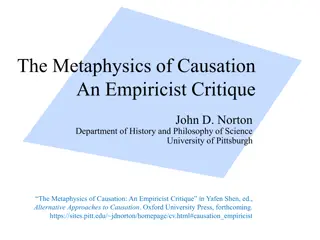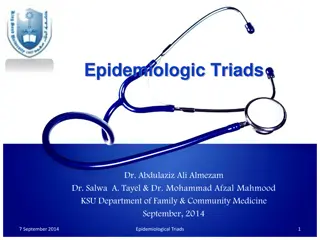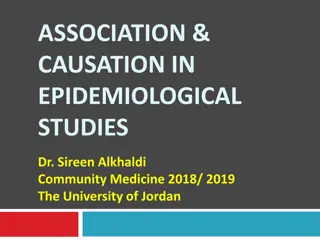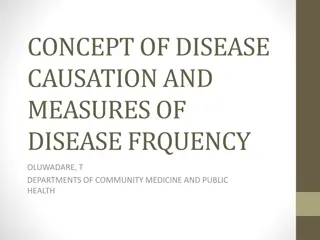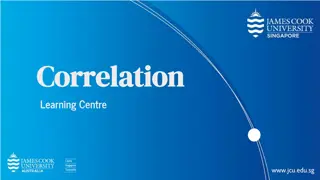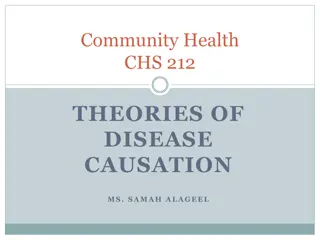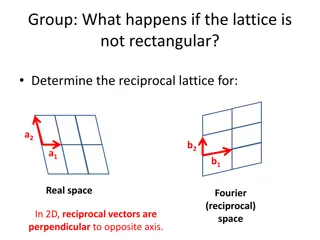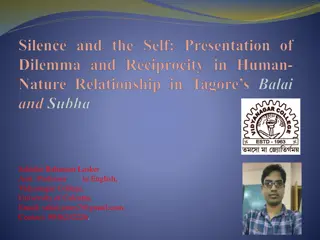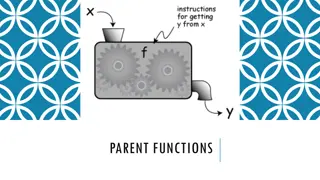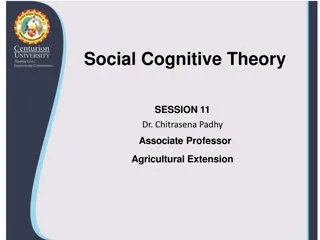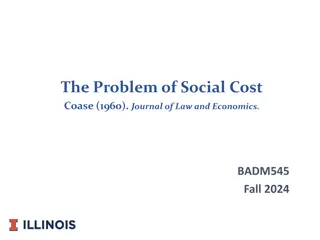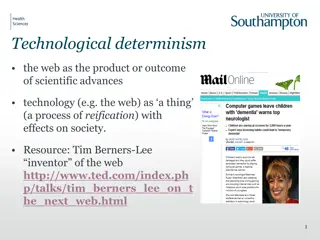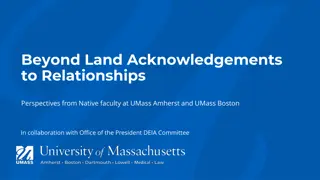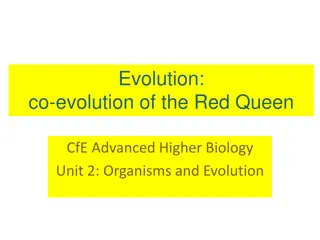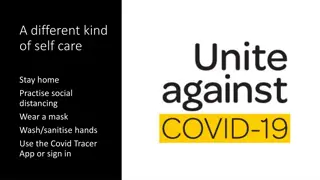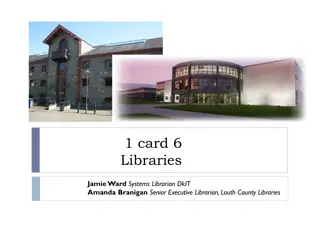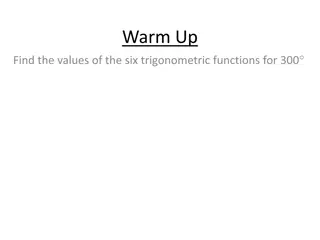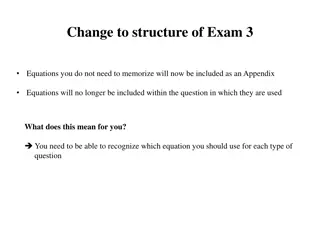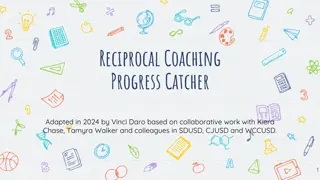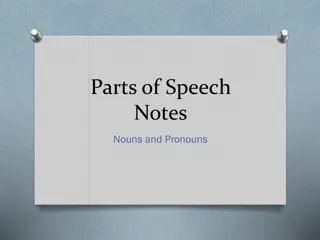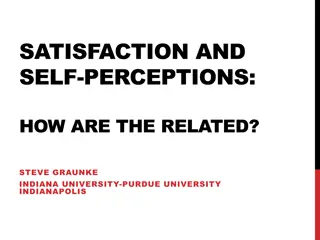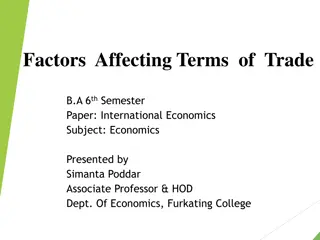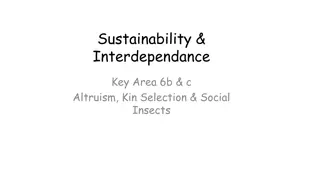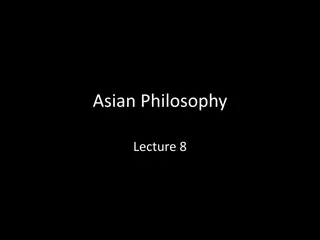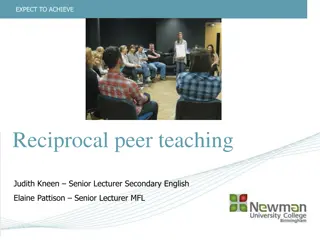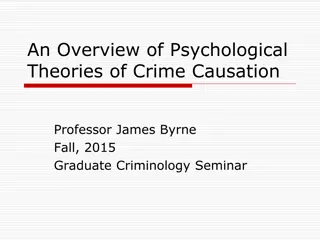Mastering Networking for Career Development
Learn about ethical networking, common myths, building networks, and connecting with others. Discover the art of reciprocal relationships to achieve professional goals. Join the Professional Services Careers Club to enhance your networking skills!
4 views • 31 slides
Critique of Causal Metaphysics and Empiricism
In this content, the author critiques the metaphysics of causation from an empiricist perspective, exploring the limitations of empiricism in understanding the contingent truths of the world. It discusses causal antifundamentalism, various forms of skepticism, including Humean skepticism, and challe
4 views • 55 slides
Understanding Epidemiologic Triads in Disease Causation
Epidemiologic triads are essential models for studying disease causation, with a focus on descriptive and analytical epidemiology. By exploring factors such as person, place, time, agent, host, and environment, researchers can identify key relationships in the spread and prevention of diseases. The
2 views • 24 slides
Understanding Association and Causation in Epidemiological Studies
Exploring the concepts of association and causation in epidemiological studies, this content delves into the complexities of determining if exposure leads to disease risk. It discusses different types of associations, such as spurious, indirect, and direct causal associations, illustrating the chall
5 views • 43 slides
Understanding Personality Development: Social-Cognitive and Behavioral Perspectives
Social-cognitive theorists view personality development as influenced by the interaction between individual traits and social context, while behavioral theorists focus on learning effects. They relate by emphasizing behavior learning through conditioning and observation, alongside mental processes.
0 views • 19 slides
Understanding the Significance of Exposure in EEOICPA Procedures
Delve into the complexities of exposure assessment in the context of EEOICPA procedures, examining the nuances of significant exposure levels and their impact on causation determination. Explore proposed recommendations for refining exposure assessment metrics to enhance causation evaluation.
0 views • 9 slides
Understanding Disease Causation and Frequency Measures
The concept of disease causation delves into the factors that play a role in the development of diseases, emphasizing the importance of studying causation for prevention, control, and treatment. To infer causation, certain conditions must be met, and a causal relationship is characterized by associa
0 views • 47 slides
Understanding Correlation and Causation in Data Analysis
A correlation analysis assesses the relationship strength and direction between two variables using the Pearson correlation coefficient. It's crucial to differentiate between correlation and causation, where correlation indicates a relationship but not causation. Exploring examples like ice cream sa
0 views • 13 slides
Theories of Disease Causation and Historical Perspectives
Explore the evolution of disease causation theories from miasma theory to germ theory, epidemiological models, and the socio-environmental approach. Understand the definition of disease, its causes, and how ancient beliefs in spiritual or mechanical forces led to new scientific interpretations.
0 views • 30 slides
Understanding Reciprocal Lattices in Crystal Structures
Explore the concept of reciprocal lattices in crystal structures, including non-rectangular lattices, Fourier space in 2D, Wigner-Seitz cells, Brillouin Zones, and the relationship between BCC and FCC structures. Learn about primitive lattice vectors, construction of the Brillouin Zone, and the sign
0 views • 49 slides
Exploring Nature and Human Relationships in Texts by Tagore
Ecocriticism in Tagore's works delves into the intricate dynamics between human, nature, and non-human elements. Nature is portrayed as a distinct entity, offering solace and companionship to characters like Balai and Subha in their silent yet profound interactions with the environment. Through uniq
0 views • 13 slides
Reduction of Feedback Overhead in IEEE 802.11be
Discussion on reducing channel acquisition overhead to support 16 Spatial Stream MIMO and Multi-AP coordination in IEEE 802.11be. Methods include limiting feedback information, using implicit feedback in reciprocal systems, and improving explicit and implicit feedback schemes.
0 views • 14 slides
Understanding Carcinogens and Causation in Cancer Research
Exploring the identification of novel carcinogens and proving causation in cancer research through examples like the Ames test, Koch's postulates, and distinguishing between causation and correlation. The challenges in attributing cancer causation and the importance of conclusive evidence for behavi
1 views • 16 slides
Understanding Parent Functions and Their Characteristics
This informative content explores different parent functions such as linear, quadratic, cubic, square root, reciprocal, exponential, and logarithmic functions. It delves into their unique properties, graphs, and functions, offering insights into domain, range, and key characteristics of each functio
1 views • 11 slides
Theories of Causation in Psychological and Social Sciences
Overview of theories of causation categorized into psychological, social psychological, and sociological perspectives. Psychological theories focus on instinctive, biological, and psychological qualities of abusers, including Attachment Theory, Psychodynamic Theory, Social Learning Theory, and Situa
0 views • 15 slides
Understanding Social Cognitive Theory: Insights from Albert Bandura
Social Cognitive Theory, developed by Albert Bandura, emphasizes learning through observation and modeling behaviors. The theory explores how individuals acquire new behaviors, thoughts, and attitudes by observing others. Bandura's famous Bobo doll experiment showcased how children imitated aggressi
6 views • 17 slides
The Problem of Social Cost: Coase's Analysis and Revisions
Coase (1960) revisited Pigou's (1920) approach on harmful actions and externalities, emphasizing the reciprocal nature of the problem. He proposed considering social net products alongside private products, emphasizing the importance of rights and efficient resource allocation. This critical analysi
0 views • 12 slides
Understanding Professional Duties in Accountancy
This informative content discusses various aspects of professional duties in accountancy, such as negligence, breach of duty of care, causation, asset valuation, and ethics. It covers topics like duty of care, foreseeability test, breach of duty standards, causation principles, and the accountants'
1 views • 10 slides
Exploring the Relationship Between Technology and Society through Historical Perspectives
This collection delves into the complex interplay between technology and society, contrasting the deterministic view with the idea of reciprocal shaping. It examines various epochs from pre-modernity to the information age, highlighting how technology has influenced cultural shifts and modernity its
6 views • 28 slides
The Grim Reaper Paradox: A Metaphysical Inquiry into Time and Causation
Exploring the intriguing Grim Reaper paradox and its implications on the necessity of finitude in time and causation, this content delves into various philosophical arguments surrounding the concept of infinity and the nature of existence. Through detailed analyses of different paradoxes and argumen
0 views • 33 slides
Understanding Murder in Common Law
Murder, as defined in common law, is the unlawful killing of a human being with malice aforethought. This act involves both actus reus (unlawful killing caused by the defendant) and mens rea (intention to kill or cause grievous bodily harm). Legal causation, including thin skull test, chain of causa
0 views • 18 slides
Exploring Land Acknowledgements in Academic Institutions: Perspectives from UMass Boston and UMass Amherst
Explore the significance of land acknowledgements in academic settings, focusing on the perspectives of Native faculty at UMass Boston and UMass Amherst. Understand the importance of developing reciprocal relationships with Indigenous communities and engaging in respectful dialogue towards creating
0 views • 9 slides
Understanding Co-evolution: A Closer Look at the Red Queen Hypothesis in Biology
Co-evolution refers to the reciprocal genetic changes in species in response to each other. The Red Queen Hypothesis, illustrated in the arms race between parasites and hosts, exemplifies this phenomenon. This interaction drives evolutionary dynamics in herbivores, plants, pollinators, prey, predato
0 views • 18 slides
Understanding Citizenship and Immigration in Modern Democracies
Citizenship, a fundamental institution of modern democracies, defines the relationship between individuals and the state through reciprocal rights and duties. However, citizenship has a dual nature, serving to both include certain individuals as citizens and exclude others. Immigrants residing withi
0 views • 21 slides
Self-Care and Community Wellbeing Reflections
Reflect on your 2020 experiences, values, and self-care practices to enhance personal and community wellbeing. Stay home, practice social distancing, wear a mask, wash hands, and use the Covid Tracer App. Embrace self-care as whanau care and community care. Explore what nourishes you physically and
0 views • 11 slides
Collaborative Partnership between Dundalk Institute of Technology and Louth County Libraries
The joint initiative aims to support the learning, knowledge, and cultural needs of County Louth residents by facilitating reciprocal borrowing, sharing staff practices, and enhancing library services. Despite facing challenges like data protection and differing regulations, the project is overcomin
0 views • 17 slides
Trigonometric Functions and Calculator Applications
Explore how calculators can be used to find trigonometric function values, approximate expressions, and determine angles using inverse trigonometric functions. Learn about evaluating functions in degree mode and utilizing reciprocal identities for accurate calculations.
0 views • 11 slides
Understanding Coevolution: An Example from Wild Parsnip and Webworms
Coevolution, a reciprocal evolutionary change in interacting species, can be observed in the relationship between wild parsnip plants containing toxic compounds and webworms that can metabolize these toxins. This example demonstrates the prerequisites for coevolution, including genetic variation and
0 views • 35 slides
Reciprocal Coaching Framework for Professional Development
The Reciprocal Coaching Framework, adapted in 2024 by Vinci Daro in collaboration with educators from several school districts, emphasizes setting goals, identifying teaching actions, and collecting artifacts to facilitate a structured coaching process. Partnerships are established, individual goals
0 views • 27 slides
Understanding Nouns and Pronouns in Grammar
Dive into the world of nouns and pronouns with this comprehensive guide. Learn about different types of nouns such as concrete, abstract, collective, and compound nouns. Explore the distinction between common and proper nouns. Discover the role of pronouns as words that substitute for nouns, includi
0 views • 7 slides
Exploring the Relationship Between Academic Satisfaction and Self-Perceptions of Learning
Discussing the interplay between academic satisfaction and self-perceptions of learning, this study by Steve Graunke from Indiana University-Purdue University Indianapolis delves into models and statistical analyses using the IUPUI Continuing Student Survey. Examining how these constructs relate, th
0 views • 21 slides
Factors Affecting Terms of Trade in International Economics
Terms of Trade (TOT) in international economics represent the ratio between a country's export prices and its import prices, influencing its trade balance. Various types of TOT include Net Barter, Gross Barter, Income, Single Factoral, Double Factoral, Real Costs, and Utility terms. Major factors im
0 views • 4 slides
Understanding Altruism, Kin Selection, and Social Insects in Sustainability
Altruism, kin selection, and social insects play crucial roles in sustainability. Altruistic behavior, like reciprocal altruism and kin selection, benefits recipients while potentially harming donors. Social insects, such as bees and ants, exemplify cooperation and societal structures that aid in ec
0 views • 29 slides
Interstate Reciprocal Overpayment Recovery Arrangement (IRORA) and Its Implementation
Explore the Interstate Reciprocal Overpayment Recovery Arrangement (IRORA), an agreement among participating states for the recovery of benefit overpayments through offsetting. Learn about the membership details, duties of requesting and recovering states, and the history of out-of-state overpayment
0 views • 17 slides
Exploring Sankhya Philosophy: Metaphysical Dualism and Causation
Delve into the ancient Sankhya philosophy, the oldest school of Indian philosophy founded by Kapila. Discover its metaphysical goal of avoiding monistic materialism and idealism, leading to a dualism between nature and spirit. Explore the concepts of Prakriti (Nature) and Purusha (Self), along with
0 views • 38 slides
Exploring Time and Change in Philosophy: Possible Worlds and Causation
Dive into the intriguing concept of time without change in the philosophical discourse presented by Cathy Legg from the University of Waikato. Delve into the Regularity Theory of Causation, examining the close relationship between time and change, challenges to traditional views, and the possibility
0 views • 27 slides
Enhancing Learning Through Reciprocal Peer Teaching in Higher Education
This presentation discusses the concept of reciprocal peer teaching in higher education, focusing on how students can take on teaching roles to enhance their learning experience. The speakers emphasize the benefits and strategies of peer teaching, providing a framework for implementing this approach
0 views • 20 slides
Understanding Correlation and Causation
Explore the concepts of correlation and causation through various scenarios such as handwashing and sickness, wearing a favorite football jersey and winning games, or memorizing study guides for tests. Distinguish between correlation and causation with thought-provoking examples like ice cream sales
0 views • 14 slides
Psychological Theories of Crime Causation: An Overview
Psychological theories of crime causation explore factors such as psychological development, childhood experiences, socialization, and individual characteristics that contribute to criminal behavior. These theories delve into the influence of mental disorders, personality traits, and psychoanalytic
0 views • 16 slides
Understanding Liability in Negligence: Remoteness and Causation
Explore the concept of legal causation in negligence cases by delving into the tests for establishing remoteness. Dive into landmark cases like Re Polemis & Furness, Withy & Co Ltd. [1921] and Overseas Tankship (UK) Ltd v. Morts Dock and Engineering Co Ltd or (Wagon Mound) (No. 1) [1961] to understa
0 views • 12 slides

